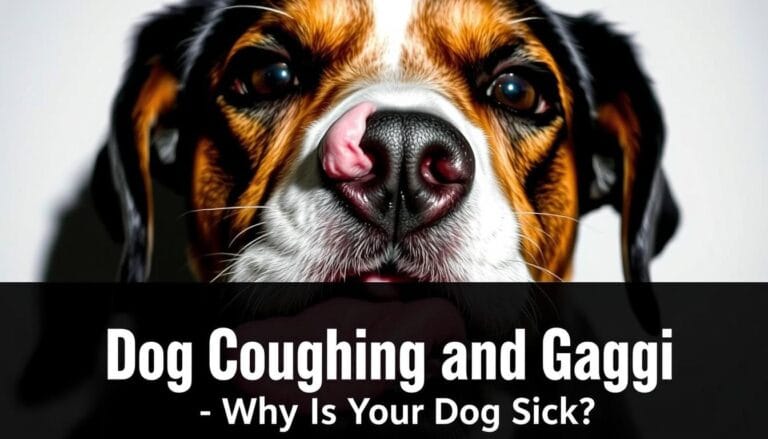Why is My Dog Shaking? Understand and Help Your Pup
Did you know that about 1 in 10 dog visits to the vet are for shaking? This fact shows how important it is to know why your dog shakes. As a dog owner, it’s key to spot the signs of shaking and act fast to help your pet. You might be thinking, “Why is my dog shaking?” and “What can I do to help?” Dogs shake for many reasons, like excitement, anxiety, or even sickness. So, it’s vital to find out why your dog is shaking to give them the right care.
Table of Contents
Seeing your dog shake can worry you. But, in many cases, it’s just normal. For example, dogs can shake off 70% of water on their fur in just four seconds. Yet, shaking can also mean there’s a health problem. So, it’s important to know the reasons and act to help your dog when they shake.
Key Takeaways
- Approximately 1 in 10 visits to animal clinics are for unexplained shaking in dogs.
- Dogs can shake due to various reasons, including excitement, anxiety, nausea, pain, and medical conditions.
- Understanding the underlying cause of the shaking is vital to provide the right care and attention when you ask yourself why is my dog shaking.
- Shaking can be a normal behavior, such as when dogs shake off water, but it can also be a sign of an underlying medical issue.
- As a dog owner, it’s essential to recognize the signs of shaking and take appropriate action to help your pup when you wonder why do dogs shake.
- Regular veterinary check-ups can help identify any underlying medical issues that may be causing the shaking.
- By understanding the possible causes of shaking, you can take steps to help your dog feel more comfortable and secure when you ask yourself why is my dog shaking.
Common Reasons Why Dogs Shake Their Bodies
As a dog owner, you might have seen your pet shake or tremble. But why do dogs shake? They shake for many reasons, like excitement, anxiety, or even physical issues like hind leg tremors. Knowing why is key to helping your dog feel better.
Dogs shake for emotional and physical reasons. Some shake because they’re anxious or scared. Others have hind leg tremors due to health problems. It’s important to find out why your dog shakes to help them properly.
Natural Body Shaking Behaviors
Dogs naturally shake off after a bath or to clean their coats. These actions are normal and usually don’t mean they’re sick.
Emotional Triggers for Shaking
Emotions like anxiety or fear can make dogs shake. For example, some dogs shake during storms or loud noises. It’s important to keep them calm and safe.
Physical Causes of Trembling
Pain or discomfort can also make dogs shake. Dogs with arthritis or stiff joints might shake because of pain. Seeing a vet is important to find out why and treat it.
Understanding why dogs shake helps you care for them better. Whether it’s emotional or physical reasons, knowing the cause helps you make better choices for their health.
Medical Conditions That Cause Dog Shaking
As a dog owner, it’s key to know why is my dog trembling and shaking. Many medical conditions can cause this. These include distemper, epilepsy, and generalized tremor syndrome. If your dog is throwing up and shaking, get vet help right away.
Certain medical conditions can cause dog shaking, including:
- Distemper: a viral disease that can cause muscle tremors and seizures
- Epilepsy: a neurological disorder that can cause seizures and shaking
- Generalized tremor syndrome: a condition that affects the nervous system and can cause shaking and tremors
It’s important to know the signs of these conditions. If you think your dog is shaking because of a medical issue, get vet help. Your vet can find out why your dog is shaking and treat it.
If your dog is shaking and throwing up, get vet help right away. This ensures your dog gets the care they need. Knowing what medical conditions can cause dog shaking helps you keep your dog healthy and happy.
Why Is My Dog Shaking? Understanding Anxiety and Fear
Seeing your dog shake can be upsetting. If you’re asking why is my dog trembling and shaking, think about anxiety and fear. About 60% of dogs experience anxiety, showing as shakes or trembles.
Signs of anxiety in dogs include pacing, panting, and my dog keeps shaking his whole body. To help, find out what causes your dog’s anxiety. Make their space safe and fun. Give them lots of exercise and mental games. Also, talk to a dog behaviorist or vet for a plan.
Signs of Anxiety-Related Trembling
- Pacing or restlessness
- Panting or rapid breathing
- Shaking or trembling
- Yawning or licking
Understanding anxiety and fear in dogs is key to helping them. Every dog is unique, so what works for one might not for another. With patience and the right help, your dog can feel calm and happy again.
Temperature-Related Tremors in Dogs
When you ask why do dogs shake, think about how temperature affects them. Small dogs are often sensitive to cold or heat. They might shake or have canine hind leg tremors to stay warm or cool.
Heatstroke can also make dogs shake. It’s important to watch for signs like too much panting and drooling. Make sure your dog has a cool place to rest and plenty of water.
To stop dogs from shaking due to temperature, you can do a few things:
- Give your dog a warm, comfy spot to rest
- Don’t leave your dog in a hot car or outside in extreme weather
- Make sure your dog always has fresh water
By following these tips, you can help keep your dog safe and comfortable from temperature-related tremors.
When Dog Shaking Indicates Pain or Illness
If your dog is trembling and shaking, it might mean they’re in pain or sick. As a dog owner, it’s key to spot these signs and act fast. Wondering why your dog is shaking can be worrying, but knowing the reasons can help you care for them better.
Signs like vomiting, diarrhea, or being very tired can mean your dog is in pain or sick. If your dog is throwing up and shaking, you need to see a vet right away. Also, watch for changes in appetite, trouble walking, or whimpering.
Emergency Warning Signs
Dog shaking can sometimes mean a serious problem. If you see any of these emergency signs, call your vet fast:
- Severe vomiting or diarrhea
- Difficulty breathing
- Loss of appetite
- Extreme lethargy
If you’re not sure about your dog’s health, it’s safer to talk to your vet. They can figure out why your dog is shaking and treat them to keep them healthy.
Understanding Breed-Specific Shaking Patterns
Exploring why dogs shake reveals the importance of breed-specific patterns. Some breeds are more likely to shake due to their genes. For example, toy breeds like Chihuahuas and small dogs often have canine hind leg tremors and shake.
Some breeds are more likely to have certain shaking patterns. Idiopathic head tremors are common in Boxers, English bulldogs, and Doberman pinschers. Knowing these patterns can help you find the cause of your dog’s shaking and reduce the risk.
Here are some key factors to consider when it comes to breed-specific shaking patterns:
- Breed predisposition: Certain breeds are more prone to shaking due to their genetic makeup.
- Size and body type: Smaller breeds and dogs with short or sparse coats may be more sensitive to cold and prone to shaking.
- Age and health: Older dogs or dogs with underlying health issues may be more likely to experience shaking.

By recognizing these breed-specific shaking patterns and taking proactive steps to care for your dog, you can help minimize the risk of shaking. Regular vet visits and a comfortable, stable home can greatly reduce shaking in your dog.
Natural Ways to Calm a Shaking Dog
If you’ve ever found yourself asking, “why is my dog shaking?”, you’re not alone. Many dog owners experience this concerning behavior, which can stem from a variety of causes, including anxiety, excitement, pain, or even cold weather. Understanding the root of the shaking is crucial, but equally important is knowing how to provide comfort. Natural methods can be both effective and soothing for your furry friend when they become anxious or fearful.
One of the simplest ways to calm a shaking dog is through the power of gentle touch. Petting your dog softly, especially in areas they enjoy—like the chest or behind the ears—can create a sense of security and comfort. Additionally, consider creating a calm environment by minimizing loud noises and distractions. Playing soft music or utilizing calming pheromone diffusers can also help ease your dog’s stress. For some dogs, having a designated space where they feel safe—such as a cozy corner with blankets or their favorite toys—can make a significant difference in their comfort level.
Another natural approach to addressing the question of “why is my dog shaking” is through the use of herbal remedies. Certain herbal supplements, like chamomile or valerian root, are known for their calming properties and can help reduce anxiety in dogs. However, it’s essential to consult with your veterinarian before introducing any new supplements to ensure they are safe and appropriate for your dog’s specific needs. Regular exercise and playtime can also act as effective stress relievers, allowing your dog to expend energy and return to a more relaxed state afterward.
Finally, exercise patience and provide a steady routine. Dogs thrive on consistency, and knowing what to expect can significantly reduce their anxiety levels. Spend quality time with your dog, engage in positive reinforcement training, and encourage socialization with other dogs when possible. Over time, these natural methods can help mitigate the shaking and build your dog’s confidence, making you both enjoy your time together more fully.
Medical Treatments for Dog Tremors
Exploring why dogs shake is key. Understanding medical treatments for dog tremors is vital. If your dog shakes due to a medical issue, your vet might prescribe medicine. They might also suggest physical therapy or acupuncture.
Pain, fever, or nausea can cause muscle spasms in dogs. If your dog ingests a toxin, tremors might spread throughout their body. Look for signs like vomiting or unresponsiveness. Seek vet help quickly if you notice these symptoms.
Tests like blood and urine tests, X-rays, and ultrasounds might be needed. In severe cases, MRI might be used. Dogs might need to stay in the hospital for treatment. This could include calming supplements or anti-anxiety meds for mild tremors.

Working with your vet is important. They can help manage canine hind leg tremors and other tremors. This improves your dog’s life quality. If you’re worried about your dog’s shaking, talk to a vet. They can find the cause and create a treatment plan.
Preventing Future Shaking Episodes
To keep your dog from shaking, make sure they get enough exercise and mental play. This helps lower stress and anxiety, which often cause why is my dog trembling and shaking. Also, having a cozy and steady place to stay makes your dog feel safer and less likely to shake.
It’s key to take your dog for regular vet visits. Your vet can keep an eye on your dog’s health and find any health problems that might make them shake. If your dog is dog throwing up and shaking, get them to the vet right away. This could mean a serious health issue.
- Providing a stable and comfortable environment
- Avoiding triggers that can cause shaking, such as loud noises or stressful situations
- Seeking regular veterinary check-ups to monitor your dog’s health
- Keeping your dog up-to-date on vaccinations and preventative care
By following these tips, you can reduce shaking episodes in your dog. This ensures they live a happy and healthy life. Always talk to your vet if you see any changes in your dog’s behavior or health.
When to Seek Emergency Veterinary Care
If your dog is trembling and shaking, it’s important to know if it’s an emergency. Why is my dog trembling and shaking worries many dog owners. Look for signs of distress like vomiting, diarrhea, or being very tired. If you see these, get to the vet right away.
Some signs that mean your dog needs urgent care include:
- Severe shaking or trembling that lasts for an extended period
- Difficulty breathing or rapid breathing
- Loss of coordination or balance
- Seizures or convulsions
- Vomiting or diarrhea, specially if it’s bloody or keeps happening
Think about your dog’s health and any past issues that might cause shaking. For example, if your dog often gets anxious, my dog keeps shaking his whole body could mean something serious is wrong. If you’re not sure about your dog’s health, it’s safer to go to the vet.
Quick action can really help your dog feel better. If your dog is shaking or trembling, call your vet or an emergency animal hospital. They can help and give you advice.
Conclusion: Supporting Your Shaking Dog with Confidence
Understanding why your dog shakes is key. With patience and care, you can make your dog feel better. Create a stable home, avoid scary things, and check in with the vet often.
Exercise, positive training, and comfort can help a lot. Watch for signs of trouble or sickness. If you’re worried, talk to your vet. With your help, your dog can get through this and be happy again.
FAQ
Why is my dog shaking?
Dogs shake for many reasons. They might be excited, anxious, or feeling sick. They could also have medical issues like distemper or epilepsy. Sometimes, it’s just because of the weather.
What are the natural body shaking behaviors in dogs?
Dogs shake for natural reasons too. They might shake off after a bath or to get rid of dirt. They also shake when they’re excited or nervous. These shakes are usually short and don’t mean they’re sick.
Can medical conditions cause my dog to shake?
Yes, some health problems can make dogs shake. This includes distemper, epilepsy, and tremors. If your dog shakes and seems sick, get them to the vet right away.
How can anxiety and fear cause my dog to shake?
Anxiety and fear can make dogs shake. Look for signs like a tense body, panting, or hiding. Making a safe space can help calm them down.
What are temperature-related tremors in dogs?
Dogs can shake due to cold or heat. Keep an eye on their temperature. Make sure they have a warm, comfy place to avoid these shakes.
When should I seek veterinary care for my dog’s shaking?
If your dog shakes and seems in pain or sick, get them to the vet fast. Look for signs like vomiting, diarrhea, or being very tired. If the shaking doesn’t stop or gets worse, see a vet.
Are there any breed-specific shaking patterns I should be aware of?
Yes, some breeds shake more than others. Knowing this can help. Keep their environment stable and comfy to reduce shaking.
How can I naturally calm a shaking dog?
Try calming methods like a quiet space, pheromone therapy, or lots of comfort. Changing their environment and behavior can also help.
What medical treatments are available for dog tremors?
Your vet might give medication or suggest other treatments like physical therapy. Always follow their advice for your dog’s health.
How can I prevent future shaking episodes in my dog?
To stop shaking, keep a regular routine with exercise and mental games. Make sure their environment is comfy and stable. Regular vet visits are also key.
There are no reviews yet. Be the first one to write one.







